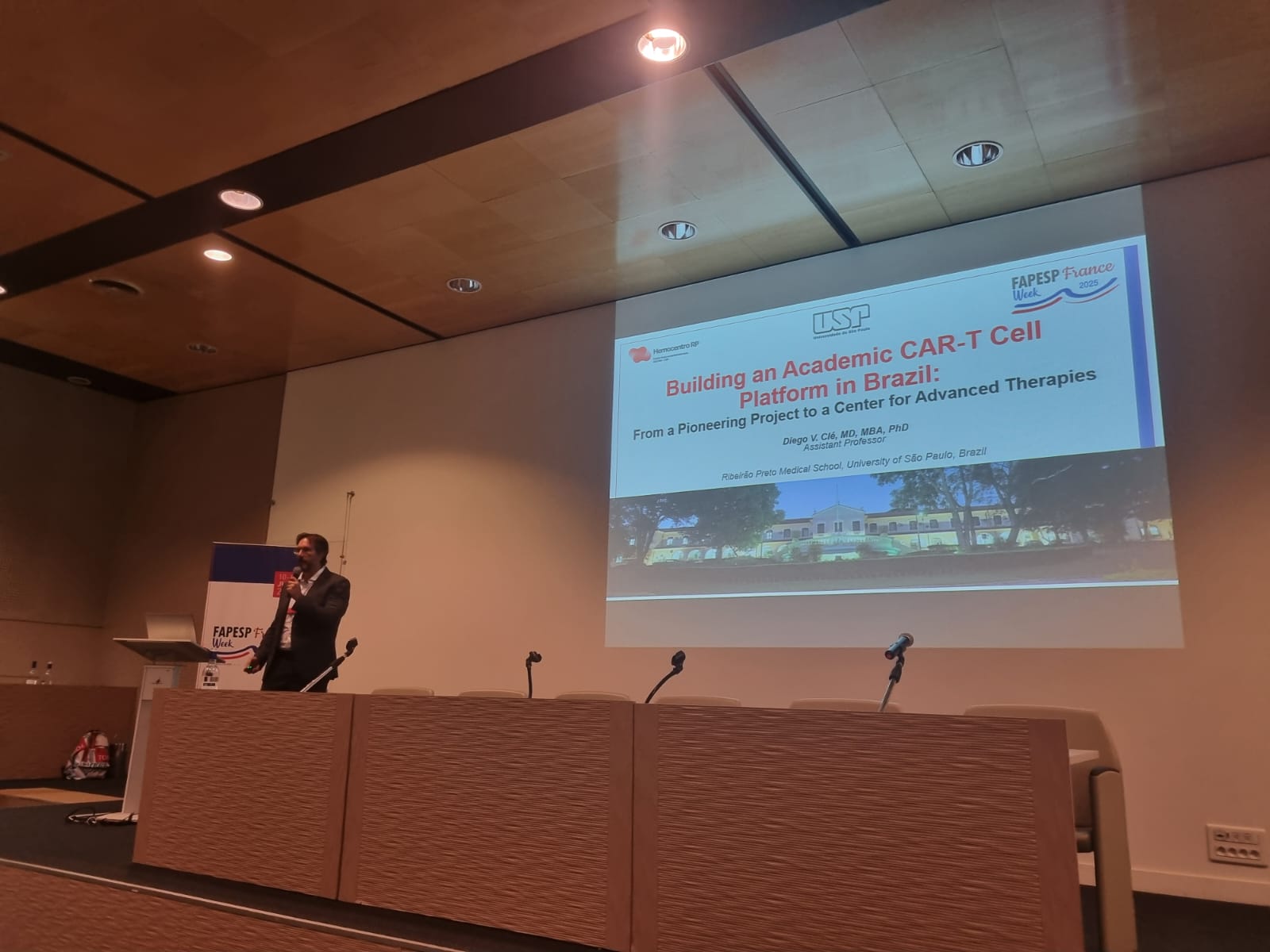


CAR-T cells (left) are T lymphocytes that are modified in laboratory to identify and eliminate tumor cells (image: CTC-USP)
Published on 06/16/2025
By Elton Alisson, from Toulouse | Agência FAPESP – Researchers from the Ribeirão Preto Medical School of the University of São Paulo (FMRP-USP) and the Curie Institute of Paris Sciences et Lettres (PSL) are set to conduct a clinical study to evaluate the safety and efficacy of a new CAR-T cell-based immunotherapy in patients with oculocerebral lymphoma.
The project involves the transfer of technology between the institutions to produce genetically modified versions of these defense cells (T lymphocytes), which were developed by French researchers for the treatment of this rare form of cancer that develops in the central nervous system and affects the brain and eyes.
The scope of the project was presented at FAPESP Week Toulouse, which took place from June 10th to 12th in the capital of the Occitanie region in southern France.
“The idea is for French researchers to bring these improved versions of CAR-T cells to Brazil and for us to help them in the final stages of development and in conducting the clinical study. Once this process is complete, we intend to establish an agreement that will allow for technology transfer, enabling us to license it to the SUS [“Sistema Único de Saúde”, the Brazilian national public health network],” Diego Clé, a professor at FMRP-USP and the project’s Brazilian coordinator, told Agência FAPESP.
Through projects supported by FAPESP (13/08135-2 and 14/50947-7), researchers at FMRP-USP began developing this advanced cell therapy in Brazil in 2019 in partnership with the Butantan Institute. The strategy, initiated in the United States in 2017, is based on the genetic modification of T lymphocytes extracted from the patients themselves and manipulated in the laboratory to identify and eliminate tumor cells.
According to Clé, the initiative resulted in the creation of Nutera in Ribeirão Preto in 2022 – the first cell product factory in Latin America dedicated to producing CAR-T cell therapy.
“Investments in basic research made by funding agencies, such as FAPESP, have enabled the development of cell therapy in Brazil, the translation of a bench product into clinical practice, and the scaling up of production with the factory,” said the researcher.
“We make a product with national CAR-T cells at a cost equivalent to one-third of the commercial products available in Brazil today, whose prices range from BRL 2.5 million to BRL 3 million. And one of the advantages of making a national product is the possibility of incorporating it into the SUS,” he emphasized.

Diego Clé (FMRP-USP): “We intend to establish an agreement that will allow technology transfer, enabling us to license it to the SUS”(photo: Elton Allison/Agência FAPESP)
The CAR-T cells produced at Nutera are initially intended to treat acute lymphoid B-cell leukemia and non-Hodgkin B-cell lymphoma. The cells of these two types of cancer have a target protein in common called CD19.
However, Nutera’s technological platform and structure allow for the development of CAR-T cells that can fight other types of cancer.
“That’s why collaboration is important. If there’s a researcher in France, for example, who’s developed a CAR-T for other targets, such as one for central nervous system lymphoma, we can test it,” he said.
“We’ll use the CAR-T they developed there to make the transition, moving toward the preclinical stage and then to clinical studies.”
The researchers are planning to use their technology platform to produce CAR-T cells that fight central nervous system cancer and treat autoimmune diseases, such as lupus nephritis. This condition occurs when systemic lupus erythematosus affects the kidneys, causing inflammation and damage. “We hope to start clinical trials next year,” Clé said.
Pioneering technology
France was one of the countries that contributed to the development of CAR-T therapy, thanks to scientists like immunologist Michel Sadelain. The PSL research group partnering with the Brazilians collaborates with Sadelain. In 1992, he began using genetic engineering tools called retroviral vectors to introduce genes into T cells. The goal was to modify the cells so that they would attack specific tumors.
The country is also a leader in Europe when it comes to treating patients with this immunotherapy. “There are more than 5,000 patients treated with CAR-T in France, compared to just less than 100 in Brazil,” Clé compared.
However, unlike Brazil, France does not yet have a national version of a product developed by local research institutions. Instead, it uses options marketed by global pharmaceutical companies. Research groups such as the one coordinated by hematologist Marion Alcantara at the Curie Institute intend to change this reality through partnerships like the one they have established with USP.
“We want to test the epigenetically reprogrammed CAR-T cells we’ve developed in patients, but there are still a number of steps we need to overcome to do so,” Alcantara reflected.
In the study conducted in partnership with the Brazilians, the French researchers aim to recruit 30 patients diagnosed with oculocerebral lymphoma. One of the objectives of the study is to evaluate the clinical efficacy of the dose of CAR-T cells that will be injected.
Source: https://agencia.fapesp.br/55068